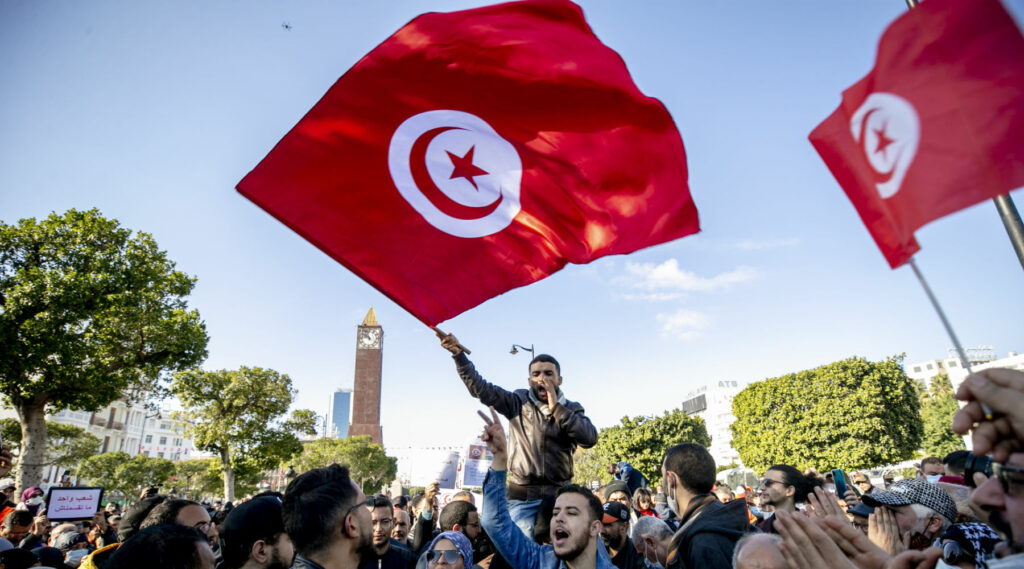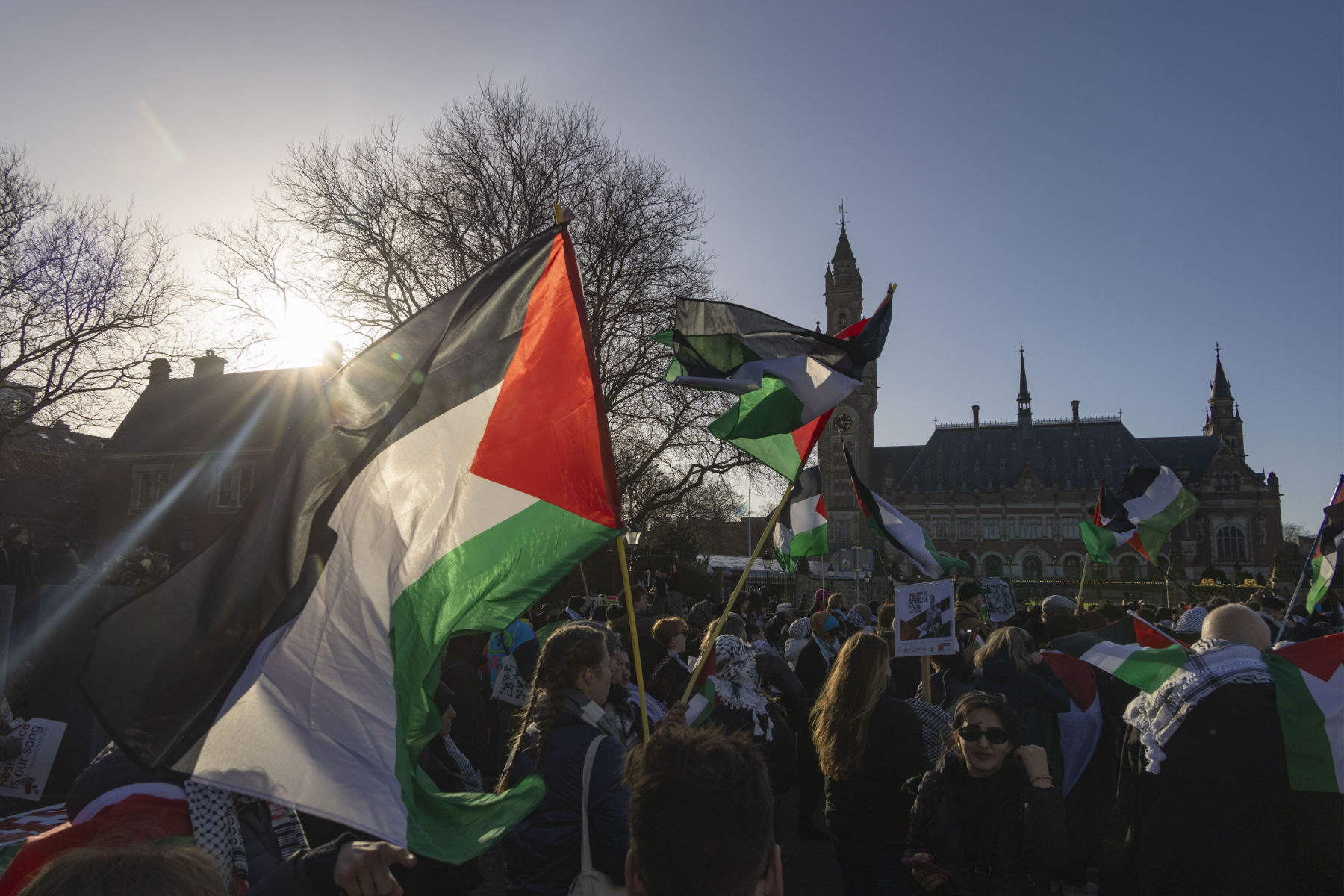John Hursh is the Program Director of DAWN and a Visiting Scholar at the Center for Human Rights and Humanitarian Studies at Brown University.
عربي
Exactly 11 years ago, Tunisia's longtime autocrat, Zine El Abidine Ben Ali, fled the country, bowing to the political pressure generated by mass protests demanding his resignation and an end to his corrupt, repressive regime. While a joyous moment for Tunisia, the following years proved extremely difficult, as Tunisia's faltering economy, political violence, and social unrest threatened to derail the country's transition to democracy. But against great odds, Tunisia completed this transition, drafting a new constitution in 2014 and holding parliamentary elections later that year—a remarkable achievement for which four Tunisian organizations, together known as the National Dialogue Quartet, shared the 2015 Nobel Peace Prize. Although a fragile democracy, Tunisia nonetheless remained the one success story of the Arab Spring, emerging as the lone democratic government to take hold after the wave of popular protests throughout the Middle East and North Africa.
This all changed last July, when President Kais Saied seized power from the rest of the government in a coup and set the country on a path toward a return to authoritarian rule. Saied, a retired constitutional law professor, won the 2019 presidential election by an overwhelming majority, running as a political outsider and vowing to end the endemic corruption that was a hallmark of Ben Ali's rule, which lasted from 1987 until 2011. Tunisia's revolution, for all its triumphs, did not rid the country of this deep-seated and corrosive graft, and Saied's popularity soared as he promised a near-singular focus on ending corruption. But after taking office, Saied struggled to keep his promise and grew increasingly frustrated with a parliament that rebuffed his policies and a constitution that limited his powers.
On July 25, Saied struck back by invoking emergency powers to dismiss the prime minister, suspend parliament and assume broad executive control, well beyond what the Tunisian constitution allows. To many, it was the definition of a "self-coup," or autogolpe, when a sitting president seizes all authority by suspending or shutting down parliament and other branches of government, often with the military's support. On Aug. 24, he extended the suspension of parliament indefinitely. Then, on Sept. 22, he went even further by granting himself the power to rule by presidential decree and to set aside constitutional provisions that conflicted with measures that he had already taken. With parliament suspended, and because he had blocked the establishment of a Constitutional Court, even though Tunisia's 2014 constitution mandated it, Saied faced no institutional challenge and had effectively consolidated all state power in his office.
After months of defiance, Saied finally acceded to domestic and international pressure to produce a roadmap for ending the imposed emergency measures and restoring Tunisia's democratic order. Unveiling his plan on Dec. 13, Saied announced that Tunisia would hold a referendum to amend its constitution on July 25, 2022, before holding parliamentary elections on Dec. 17, 2022. He also said that he would hold a series of online public consultations to collect ideas that a commission would then use to draft constitutional amendments. Weeks later, Saied said that he would "review" the judicial system, including the organization of the courts and the rights afforded to members of the Supreme Judicial Council, an independent body that oversees the appointment and promotion of judges, as well as the independence and impartiality of the judiciary.
The military's involvement in Saied's ongoing coup is especially troublesome, as historically Tunisia's military has largely avoided involvement in civilian politics, even under Ben Ali.
- John Hursh
These announcements did little to assuage fears of Saied's indefinite authoritarian rule. Far from returning Tunisia to a democratic path, this plan allows Saied to retain essentially absolute power for the rest of 2022. Parliament will remain suspended until after December's elections, and Saied already issued a presidential decree that gives him sole authority to appoint the commission that will draft the constitutional amendments. In other words, Saied will control the constitutional amendment process, as well as the substance of the amendments themselves by picking the drafters to serve on the commission.
The online public consultation is also highly problematic. Secrecy and privacy concerns remain unaddressed, and at least one-third of Tunisians lack internet access. Saied's plan does allow for some vaguely worded, in-person alternatives, but his government's suppression of freedom of speech and crackdown on political opponents have had a severe chilling effect on political life in Tunisia that will eliminate most criticism during the public consultation. Nonetheless, Saied is pressing ahead, and the online platform will officially launch on Jan. 15 and end on March 20.
In addition to these shortcomings, Saied followed the announcement of his roadmap with brazen attacks on his political rivals. Two weeks ago, on Dec. 31, plainclothes security agents from the Ministry of Interior abducted Noureddine Bhiri, a prominent member of parliament and former minister of justice, from his home without an arrest warrant. Agents moved Bhiri to an undisclosed location before transferring him to a hospital on Jan. 2, due to preexisting health conditions. Bhiri remains detained and under prison guard at the hospital, although the government has not charged him with any offense. The same day that they detained Bhiri, security agents also abducted and detained Fathi Beldi, a former Ministry of Interior official, holding him in an undisclosed location until Jan. 4.
The World Organization Against Torture, known by its French acronym, OMCT, condemned these moves and described Bhiri's house arrest as "more akin to arbitrary detention." Numerous human rights groups, including Human Rights Watch, also called Bhiri and Beldi's abductions arbitrary detentions. On Jan. 11, the U.N. Office of the High Commissioner for Human Rights issued a statement urging Tunisian officials to "promptly release or properly charge" both men, while noting that these developments "have deepened our already serious concerns about the deteriorating human rights situation" in Tunisia.

Meanwhile, a court in Tunis had announced in early January the prosecution of 19 high-profile political officials for alleged electoral crimes, including Rached Ghannouchi, the speaker of parliament and president of Ennahda, the Islamist political party, along with four former prime ministers and former President Moncef Marzouki, who now lives in Paris. These abductions, arbitrary detentions, and targeted prosecutions show Saied's continued willingness to bend Tunisia's judiciary to his own will and repeat Ben Ali-era tactics. Saied has also abused counterterrorism laws to stifle dissent and used military courts to try civilians, often for the supposed crime of "insulting the president." The military's involvement in Saied's ongoing coup is especially troublesome, as historically Tunisia's military has largely avoided involvement in civilian politics, even under Ben Ali, a notable exception to many authoritarian governments throughout the region.
The Biden administration has responded tepidly since Saied's power grab last summer. Following Saied's dismissal of Prime Minister Hichem Mechichi and suspension of parliament, the State Department issued a rote statement that the United States was "closely monitoring developments." A July 26 call between Saied and Secretary of State Antony Blinken was equally noncommittal, as Blinken merely encouraged Saied "to adhere to the principles of democracy and human rights that are the basis of governance in Tunisia."
Frustrated by the Biden administration's overly cautious approach, a group of Democratic lawmakers pushed the issue in late September by requesting Blinken determine whether Saied's actions amounted to a coup and urging the State Department to take "stronger diplomatic steps" than it previously had. The State Department has yet to make its coup determination—which would legally require the U.S. government to suspend financial aid to Tunisia—and instead offered another waffling statement following the formation of a new, rubber-stamp Tunisian government in November, which lacked parliament's approval even though it is constitutionally required.
The State Department's response to Saied's roadmap was just as disappointing, as it welcomed the "announcement of a timeline outlining a path for political reform and parliamentary elections and looked forward to a reform process that is transparent and inclusive of diverse political and civil society voices." At best, this statement comes across as misguided. As Anthony Dworkin of the European Council of Foreign Relations notes, "Nothing Saied has done over the past several months suggests that he has any desire for transparency or inclusivity. It would be naïve to expect him to suddenly change course over the next year when he has solidified his power with no legislature or constitutional court to stop him."
Unwilling to compromise and unable to accept economic reality, Saied's authoritarian detour now risks an even starker turn.
- John Hursh
A stronger U.S. statement would have tied the legitimacy of the roadmap to the meaningful involvement of a wide range of political parties and civil society organizations. Likewise, such a message would not have implicitly endorsed a plan that allowed Saied to continue ruling without parliament for the next 12 months. The Biden administration's lackluster response has allowed authoritarian countries within the region to exert their influence in Tunisia more freely. Following Saied's power grab, Saudi Arabia, the United Arab Emirates, and Egypt all offered their support for the coup. Saudi Arabia and the UAE reportedly even offered Saied $5 billion in financial support if the coup succeeded. More recently, reports claim that at least one high-ranking Egyptian intelligence official is working within Saied's presidential security.
Nonetheless, despite Egypt's hints of military and intelligence assistance, and the deep pockets of the Saudis and Emiratis, Saied's popularity continues to decline sharply. Most notably, a December poll showed that Saied's approval rating has dropped 32 points to 55 percent since a high of 87 percent immediately following his July coup. Of those Tunisians dissatisfied with Saied, 73 percent believe he has "no plan" to address Tunisia's overlapping economic and political crises.
Saied's falling popularity is certainly due in part to the country's continued economic struggles. Tunisia's public debt remains a pressing issue and requires external assistance. A government plan submitted to the International Monetary Fund in early January includes a freeze on public sector hiring and wage increases for the next three years. It would also remove energy subsidies and restructure public enterprises, while a 2022 draft budget includes new taxes. These economic measures will prove deeply unpopular, as they will raise fuel and electricity costs even as many Tunisians struggle to meet basic needs. Unsurprisingly, the powerful Tunisian General Labor Union, which claims more than 1 million members, strongly opposes these measures.
While Saied inherited many of Tunisia's economic problems, he also has contributed to and exacerbated them through his decisions. For example, IMF officials have stressed that the Tunisian government must agree on a credible economic reform package to receive financial assistance for the country's debt, but also that Saied must return the country to a normal, inclusive economic order. Neither outcome seems likely, and earlier this year, after international rating agencies downgraded Tunisia's credit rating, Saied responded dismissively. "The rating agencies cannot give us any grades they want," he said. "We are not their students, and they are not our teachers."
Saied's populist rhetoric may score points with his supporters, but they will not placate international investors, nor stave off financial distress for many Tunisians. Rather, they seem to confirm that Saied has no plan to seriously address Tunisia's economic woes, including corruption. Unwilling to compromise and unable to accept economic reality, Saied's authoritarian detour now risks an even starker turn.






































